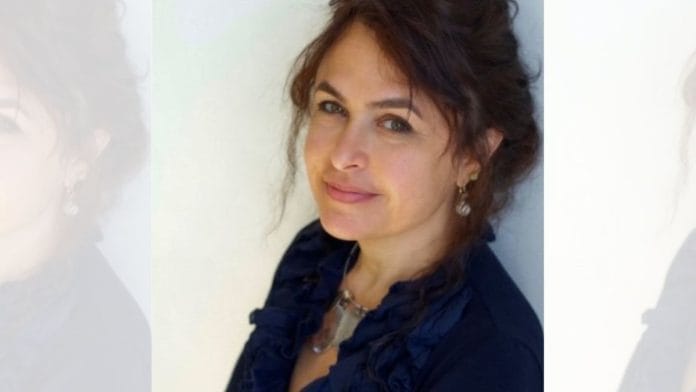Jaipur: No poetry has been as dark as the poetry that has been coming out of Gaza in recent months, British-Palestinian author Selma Dabbagh said on the sidelines of the Jaipur Literature Festival.
“Poetry written by young people, who are just praying that they can die in one piece, so that they can be buried with their head and arms…” she said in an interview to ThePrint, speaking about Palestinian art and artists amid the Gaza conflict.
“After coming across these poems, you learn they died hours later, probably in a state that their bodies will never be recovered… but their words remain hanging.”
Dabbagh’s debut novel, Out of It, based on the 2008 air strikes on Gaza by Israel, came out in 2011, while her shorter writings have been published by the PEN International, The Guardian and London Review of Books.
Before she took up writing, Dabbagh used to work as a human rights lawyer in the West Bank.
On the assault on Palestinian artists, she said that the “targeted killing of (poet and professor) Refaat Alareer is a case in point”.
“He died with most of the members of his family in his apartment,” she said.
Israeli airstrikes have also killed novelist Heba Abu Nada, playwright-actor Inas al-Saqa, writers Yousef Dawas, Omar Abu Shawish and Jihad El-Masry, among others.
On the role of artists in telling the Palestinian story to the world, Dabbagh said: “We have had to train ourselves to articulate before the camera, often facing very hostile audiences. Our voices are often censored out. Especially at the beginning, the main question was whether we condemn Hamas, which would immediately put us on the backfoot, which ignored Palestinian history, which goes back to centuries on the land and entails the tragedy of the continued ethnic cleansing.”
Despite the backlash, the voice of artists has been instrumental in communicating the Palestinian story, she added.
Explaining further, Dabbagh shared how the writers’ group PEN America cancelled its 2024 awards after 28 of the 62 nominated authors dropped out amid criticism of the organisation’s response to the Gaza conflict. Honouring their decision, PEN America then donated the $75,000 award money to the Palestine Children’s Relief Fund.
Attributing the PEN America decision to “internal campaigning”, Dabbagh said that such campaigning is more effective than individual efforts “not only in Palestine but politics in general, as we enter a particularly worrying era, especially after (Donald) Trump’s election (as US President)”.
Dabbagh also commented on the courage of artists such as Palestinian-American author Susan Abulhawa, who, in her address at the Oxford Union, shed light on the Palestinian cause, saying: “She was a force of nature. It is scary doing these things.”
In resolving the Gaza crisis, Dabbagh sought the support of the “Global South” and India.
“We look very much to (Mahatma) Gandhi and non-violent resistance. We have for a long time been engaged in non-violent resistance, both in Gaza and West Bank, but faced severe violence in response… But like (author) Arundhati Roy said in her PEN Pinter Prize acceptance speech (in 2024), we couldn’t have used non-violent resistance longer or more creatively,” she said.
For a long time, Palestinians have lost the war on images—which remains very much controlled—Dabbagh said, pointing out the connection between Hollywood and Israel.
“Hollywood has worked with Israel to promote its image, and to downgrade as a natural result of that the image of Arab Muslims, particularly Palestinians. You hardly see a film where we are not either normal tropes or terrorists or, at best, victims,” she said.
Dabbagh also commented on the perniciousness of “Israeli propaganda”, saying: “It is like we (Palestinians) have this drive for violence and vengeance; above all, none of us want jobs, homes or families.”
However, she added, young people, such as Palestinian journalist Bisan Owda and Renad Attallah, who posts her cooking recipes on social media, are helping change the image of Palestinians. “People’s sympathies are with us more than ever,” she asserted.
(Edited by Nida Fatima Siddiqui)







I agree that there is a extreme position taken by current US administration. but what about the propaganda by left-green alliance?
Especially at the beginning, the main question was whether we condemn Hamas, which would immediately put us on the backfoot,
A hungry man with hungry children is still not justified in murdering his neighbour for food. What is th ambivalence is opposing kidnapping rape and murder. Unless all religions need not get equal treatment. Palestinians must be aĺlowed their excesses since they have a history.